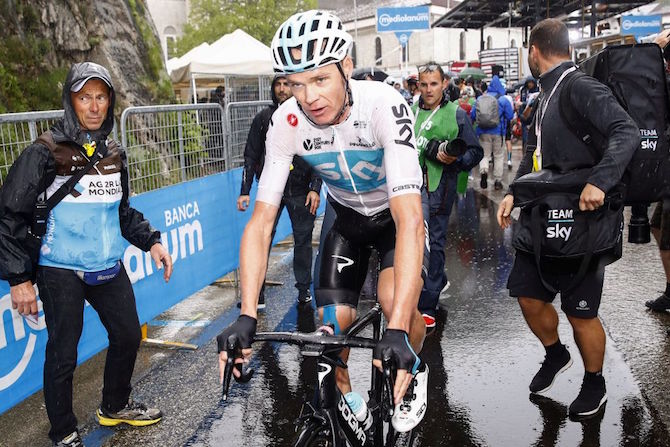WADA deny giving Chris Froome a legal loophole by avoiding pharmacokinetic study
'We're not questioning the rules with this decision' says WADA science director




The World Anti-Doping Agency (WADA) has told Cyclingnews that Chris Froome has been treated like any other athlete, with WADA carefully adhering to its own rules in a unique case, despite Froome not undergoing a controlled pharmacokinetic study (CPKS) to try to replicate his high level of salbutamol.
Timeline of Chris Froome's adverse analytical finding for salbutamol
Chris Froome's salbutamol defence boosted by scientific study
UCI closes salbutamol case against Chris Froome
WADA will not appeal UCI verdict on Chris Froome salbutamol case
Clearing Chris Froome lacks credibility without providing evidence, says anti-doping expert
Chris Froome: Information on salbutamol case to be released in coming days
Petacchi feels vindicated by resolution of Chris Froome case
More details of Chris Froome's successful salbutamol defence
WADA's science director Dr Oliver Rabin insisted that Froome's verdict does not undermine the fight against specific substances such as salbutamol. However, he admitted that there should perhaps be a review of the medical guidelines on the amount of salbutamol that is legally allowed as asthma medication, to help reduce any possible grey areas of abuse.
Froome's urine sample from stage 18 of the Vuelta a España was over WADA's threshold limit for the controlled drug used to treat asthma. Under new rules introduced during the winter, the amount of salbutamol in Froome's sample was corrected for specific gravity to counter the effects of dehydration to 1,429ng/ml, still significantly over WADA's so-called 'decision limit' of 1,200ng/ml, which already takes into account a measure of uncertainty.
WADA's rules oblige athletes to prove, via a controlled pharmacokinetic excretion study (CPKS), that any abnormal result is the consequence of the use of the therapeutic dose via inhalation. However, WADA accepted that Froome did not have to undergo a CPKS, due to the unique circumstances that preceded his doping control on September 7.
Instead, WADA accepted claims and evidence submitted that Froome had been ill, taken higher doses of his asthma medication and that some dietary supplements and some of the medicines he took to treat his infection could have interacted with salbutamol to spark a higher level in his urine.
Neither the UCI or Froome have yet to reveal details of the case and how the final verdict not to pursue the case was reached, with Rabin telling Cyclingnews that any detailed information would have to come from UCI. The UCI has not responded to request from Cyclingnews regarding the publication of the details or any form of Reasoned Decision.
Froome told Sky News on Tuesday that technical data from the case would be "fully communicated in the media in the next few days". However, Team Sky have now told Cyclingnews that they won't be putting out more information, suggesting it is a UCI/ WADA process to decide what to put out and when.
Get The Leadout Newsletter
The latest race content, interviews, features, reviews and expert buying guides, direct to your inbox!
No loophole
Rabin denied that the lack of a CPKS test gave Froome a loophole to avoid having to try (and possibly fail) to recreate his high level of salbutamol under laboratory conditions.
Diego Ulissi – the last major rider to fail a salbutamol test was given a nine-month ban when he reportedly failed to replicate his high levels during a CPKS.
"Mr. Froome's case is not unique. The conditions are unique. The way we looked at Mr Froome was like with another case. A case like this is rare but happens once in a while. Then we make a judgment based on the unique aspects of the case," Rabin told Cyclingnews in a telephone interview.
"This is not the first time we [have] reviewed a case with a high concentration of salbutamol. The only difference in this case is that Mr. Froome is a very well known athlete; his case was in the media after it was leaked – and certainly not from us. But there's nothing different to what we've done in the past and what we'll do in the future.
"The very unique situation in this case is that there was an increase of the dose in the preceding couple of days before the sample was taken on September 7. It's well documented that he was not feeling very well, that he had infection and exacerbation of his asthma. There were some claims that some of his diet and dietary supplements, and some of the medicines he took to treat his infection, could have also interacted with salbutamol.
"In the end the controlled pharmacokinetic study would not have been practical, not to say impossible, that was obvious. You cannot reproduce a lung infection and also mimic all the physical efforts required from an athlete during the Vuelta. We considered the evidence to be scientifically good enough so that there was enough doubt that these could have affected the secretion of salbutamol."
Rabin was unable to say if this was the first time that WADA had gone against its own rules and that an athlete had not undergone controlled pharmacokinetic study as part of an investigation into an Adverse Analytical Finding.
"This I cannot say. There are many cases and I don't see them all, so I can't be categorical that it's the only one. It's one case that we thought the controlled pharmacokinetic study would not be practical," he said.
"I don't recall a case where we would have a similar cyclist, riding a Grand Tour, in this situation, this was quite unique and quite complex. We decided that if it's impossible to use, we would then look at information we have and judge on that. You look at all the elements in the case provided by the athlete and you see if they're coherent or not.
"I've reviewed a number of cases. For a few of them, we have had to accept that there is enough information that says: 'No prosecution'; that the documents and explanation is good enough to say to we won't prosecute and we won't appeal the case.
"In the end, the conclusion we got from our experts was that we could not consider this to be an AAF.
"It's not a precedent. We take this case as unique. We think it was the right and fair outcome from a very complex case. Each case is unique. We're not questioning the rule with this decision."
Against provisional suspensions for specific substances
Rabin refuted that WADA was at fault for the Froome case lasting almost ten months, with a verdict only reached on the eve of the Tour de France.
"That is a question for the UCI, they handled all the interaction with the lawyers," Rabin said.
He also dismissed calls for athletes with specific substances cases to be provisionally suspended until a verdict, revealing that WADA annually deals with between 10-20 salbutamol cases, with most linked to Therapeutic Use Exemptions.
"Can you imagine how many athletes would be provisional suspended? That could be a risk. But I don't have dogma on this. All stakeholders can comment and make recommendations but I don't think you shouldn't question the rule based on one case."

Stephen is one of the most experienced member of the Cyclingnews team, having reported on professional cycling since 1994. He has been Head of News at Cyclingnews since 2022, before which he held the position of European editor since 2012 and previously worked for Reuters, Shift Active Media, and CyclingWeekly, among other publications.